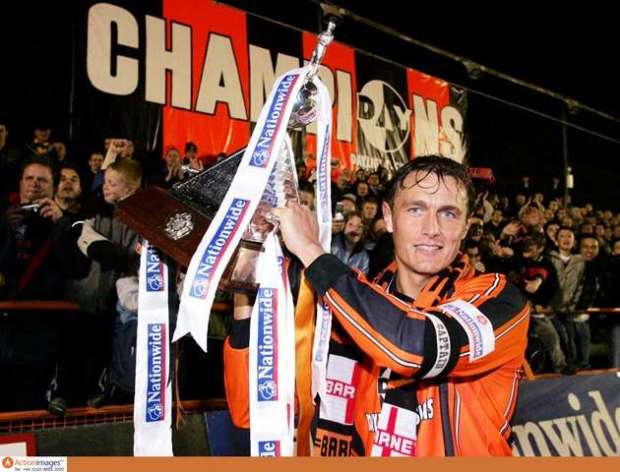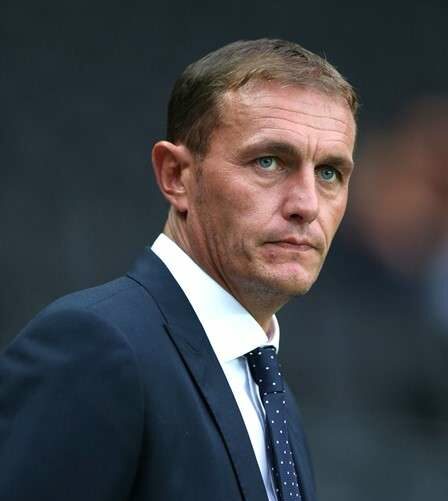ASK a Barnet fan to name the club’s finest ever skipper and one name will emerge again and again – Ian Hendon.
The big stuff won minds. The full-blooded tackles, the talismanic leadership, the cool penalties at crunch moments. The cup runs, the great escapes, the Conference trophy he raised aloft.
“When you’ve got a player like Ian Hendon in the dressing room,” said former Bees boss Paul Fairclough, “being a manager becomes very easy.”
But it was the little things that won hearts, like the league game at Stevenage in September 2003.
Injured during the first half and subbed at half-time, Hendon limped around the pitch to join the supporters in the away end. There, he chatted to fans, signed autographs, joined in their songs and, when Barnet scored, disappeared under a pile of adoring bodies.
Then there were the home visits; to one Barnet fan recovering from heart bypass surgery; to another recovering from injuries sustained in a train accident.
“I’d gone on loan from Sheffield Wednesday and ended up finding a place that felt like home,” said Hendon in 2009. “It is very tight-knit there and the supporters are great – you virtually end up knowing them all by name and I still speak to some of them now. They were great times.”
Yet, if Hendon eventually came to love life on the down low at Underhill, it was hardly what he’d dreamed of as a kid.
Born in Ilford, the young centre-half played for Essex County and then England schoolboys before winning an apprenticeship at Spurs – the club he’d loved as boy.
But despite captaining the FA Youth Cup winning side of 1990 (in a side that included future England keeper Ian Walker) and winning seven caps for the England Under-21s, his success never translated to the first team.
“Technically, Ian was a solid player,” said Spurs former youth team boss Keith Waldon. “But his real strength was his personality and his leadership. I think that’s maybe what held him back at the highest level.”
Overlooked by Terry Venables and Ossie Ardiles, he made just four substitute appearances – including one in the 1991 Charity Shield against Arsenal – before being sold to Leyton Orient for £50,000 in 1993.
It remains, according to Hendon, the single “biggest disappointment” of his career.
Yet the remainder of his playing career can hardly be called a disaster.
At Orient – the club closest to his father’s heart – Hendon scored five goals and played 153 games, while refusing to join the mass exodus as wages went unpaid and administration beckoned.
Then, at Notts County, he captained Sam Allardyce’s all-conquering side, who won the Third Division title with six games to spare and broke a string of club records along the way.
“I still remember the buzz and the spirit we had that season,” said Hendon in 2009. “We used to spend hours in the club lounge after every game, just enjoying each others’ company. I can still name every member of the squad, which tells you how close we all were.”
At Northampton he won promotion from Division Three and a berth in the PFA team of the year, earning himself a move to Sheffield Wednesday.

Then, in 2003, came Barnet, the club he joined at 32 and two years later led into the League.
“I signed Ian for Barnet,” said Martin Allen, now in his third spell as Bees boss. “He must be one of the best signings I have ever made. He is a great guy off the field, a great player on the field. It is no surprise he has gone on to be a very good coach.”
It is a transition that Fairclough, who took charge at Underhill in 2004 and later appointed Hendon as his No.2, believes began while the defender was still on the pitch.
“Ian was a natural leader,” he said. “And he was very demanding of players around him. If he wasn’t getting what he wanted, he wouldn’t be shy about letting you know.
“We had a lot of young players and he was a very imposing figure. When he spoke, you took notice. Coaching was an obvious progression.”
Less successful, however, was an ascent to manager in 2008; what started with an escape from relegation and a brief stint at the summit of League Two ended in his dismissal after a disastrous run of defeats.
“I think it just came a bit too soon,” said Fairclough, who was Barnet’s director of football at the time. “He was passionate and he loved the club, but he didn’t have the experience to get over that bad spell.”
And now? After spells coaching under Andy Hessenthaler at Gillingham and Allardyce – his old mentor – at West Ham, Fairclough believes Hendon is fully equipped to bring Orient success.
“Ian is a young man with old fashioned values,” he added. “As a player he was immaculately turned out. His kits were clean, his boots were clean. He’d be ready for training well before time.
“It’s was all about respect and personal organisation for Ian – a legacy of growing up at a professional club.
“His team will be disciplined, with a code of conduct set out in black and white.
“The fundamentals are all in place. Now it’s about how he gets through that tough period, because he will have one at some stage for sure.
“But I’m confident that he learned some really big lessons during his time at Barnet – and that he’ll know how to use them this time around.”
















